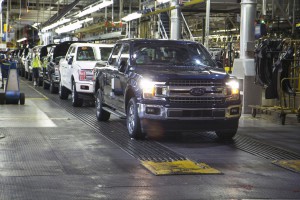Already facing a number of lawsuits related to faulty transmissions, Ford has been hit with another class action, this one alleging the automaker falsified fuel economy numbers for its F-150 pickups.
The lawsuit, filed in the U.S. District Court for the Eastern District of Michigan, claims owners of 2018 and 2019 F-150s could wind up spending an extra $2,000 on fuel due to the lower mileage the trucks deliver. Filed on behalf of pickup owners by Seattle’s Hagens Berman, a plaintiff’s law firm known for aggressive actions in the automotive space, the suit seeks a payout of $1.2 billion.
Calling Ford’s mileage claims “all smoke and mirrors, Steve Berman, the law firm’s managing partner, said in a news release that, “Ford’s lies about the F-150 are masking the truth: Consumers are paying far more for these trucks than meets the eye. Over the lifetime of the vehicle, we believe F-150 owners are paying more than $2,000 more for fuel.”
(Ford Knowingly Made Millions of Fiestas, Focuses with Faulty Transmissions)
The mileage offered by the F-150 has been a big selling point for Ford, something it has pitched as a key advantage of its shift from a steel to an “aluminum-intensive” body with the launch of the current-generation F-150. (The Super Duty models have also adopted that design.) On an apples-to-apples basis, Ford has claimed to have the best fuel economy among all full-size pickups.
But its numbers have been challenged by some owners and experts and, last February, the automaker confirmed that it was launching an investigation into the internal process used to calculate the truck’s fuel economy. Manufacturers routinely run their own tests which are then certified by the Environmental Protection Agency.
According to an anonymous internal complaint the automaker received last September, the tests were improperly conducted and overstated the mileage an owner can expect. In particular, the whistleblower said the tests improperly analyzed test processes known as “coastdown” and “road-load.” These factor in things like road resistance and aerodynamic drag to simulate what a vehicle’s mileage would be in real-world conditions.
“Ford fudged its coastdown testing and used inaccurate drag and resistance figures to boost the vehicles’ EPA mileage ratings,” Hagens Berman said in the new federal lawsuit.
(Feds Launch Criminal Probe Over Ford Mileage, Emissions)
A spokesman for Ford said “not to confuse claims with merit.” But the plaintiffs attorneys aren’t the only ones trying to get to the bottom of what happened. Federal regulators are also reported to be watching to see what comes out of Ford’s internal investigation.
This is just the latest instance in which Ford’s mileage numbers have become suspect. The U.S. Department of Justice is currently running a criminal probe into Ford’s the processes used to calculate mileage numbers for the 2019 Ford Ranger, and the automaker’s analytical and coastdown procedures are also getting close scrutiny there.

The 2012 Ford Focus is one of hundreds of thousands of vehicles with a defective transmission, a new report suggests transmission,
Ford’s problems also include an ongoing controversy centering around the double-clutch transmission it has been using in its Fiesta and Focus models. The gearbox has been the source of numerous quality problems and, according to critics, also poses a safety risk. The automaker is trying to complete a deal that would resolve one class action lawsuit but other suits are in the works, while consumer and safety advocates are also pressing for a major recall.
Ford is not the only automaker to face questions about its mileage testing procedures. Earlier in the decade, the Hyundai Motor Group acknowledged errors in its procedures that overstated the fuel economy of products like the Kia Soul by as much as 6 mpg. It spent hundreds of millions of dollars in fines, settlements and compensation for consumers.
(Ford Investigates Potential Errant Fuel Economy, Emissions Reporting)
Rigged diesel emissions tests, meanwhile, have so far cost Volkswagen AG more than $30 billion.


